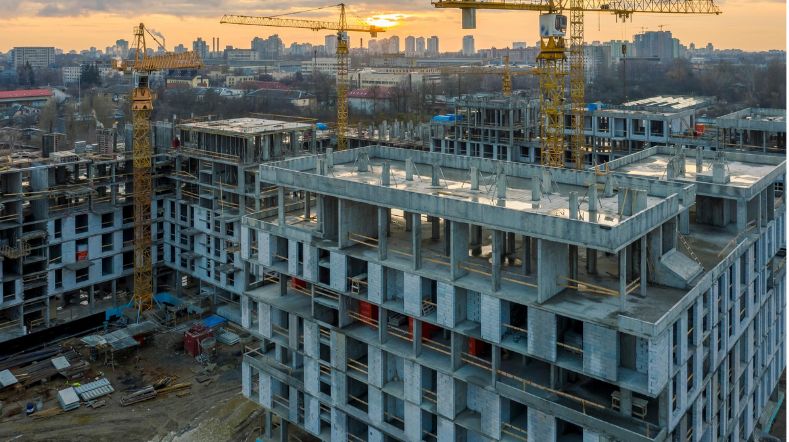
Future building materials
TNO has extensive knowledge of the environmental effects of building materials. We are working on increasing the circularity of building materials with a focus on making concrete more sustainable as well as developing circular innovations for brick, gypsum and wood. TNO Building Materials helps the construction industry and governments with research, monitoring, and scaling up towards the market of sustainable material innovations
Climate change and the materials transition
The Netherlands is in the midst of the transition to a circular construction economy. Carbon emissions and the use of primary materials must be halved by2030; by 2050, there should be no carbon emissions at all in construction and primary materials use should be minimised. This change also entails an energy and materials transition for construction.
One challenge here is that existing processes for predicting the service life and performance of materials and structures often no longer work for the many new sustainable materials being used.
Moreover, the burden of stone-based materials is changing under the influence of climate change. With the expected sea level rise, the salinity of our groundwater in the coastal provinces is rising, which can affect brick masonry. Weather extremes can also cause concrete structures to degrade faster under the influence of CO2.
Our vision
These challenges put higher demands on materials and structures, as environmental impact and circularity are also important, in addition to safety and cost. TNO Building Materials helps meet these demands with advanced techniques for validating and predicting material performance, and innovative product development. We provide the knowledge and confidence that enable our partners to protect the stone-based materials of their buildings and structures for current and future generations. We focus on reducing both carbon emissions and primary materials use by:
Preserving houses, office buildings, bridges, and viaducts makes the biggest contribution to reducing emissions. In addition to technical knowledge for extending the service life, TNO offers know-how for factoring user considerations into decisions. What measures can you take to extend the service life as effectively as possible?
In addition to service life extension, demand for new construction will remain high. To make this as sustainable as possible, TNO focuses on the reuse of elements such as floors or walls, which has bigger impact on cutting carbon emissions than the reuse of granulates.
The production of cement for concrete contributes significantly to carbon emissions in the Netherlands. TNO is therefore exploring alternative binders, such as geopolymer concrete, which instead of cement uses earth-based materials that are alkali-activated. This provides properties and performance similar to cement brick, with a cut in carbon emissions of up to 80% in the production phase.
What we offer
At TNO Building Materials, we help companies and governments transition to a circular way of building in an accessible way. We do so through the following four activities:
With targeted lab research, we support companies with specific questions. To demonstrate the properties of a new product, TNO can develop a customised test method or set up a monitoring study to validate performance. We also provide small-scale on-site advice, for example, on preservation and product development.
The TNO Building Innovation Lab is a state-of-the-art facility where we conduct applied research into innovations in building materials, climate systems, and structures. Using tailor-made test and research set-ups customised to specific client needs, we study the performance and ageing of materials to determine whether innovations meet practical requirements.
TNO is capable of setting up complex studies, supported by the right lab facilities and delivering reliable results, often in Public-Private Partnerships. A notable example is the living lab established with Rijkswaterstaat, where TNO is monitoring the use of geopolymer concrete by provincial authorities and water boards over a five-year period.
TNO Building Materials stands out for its broad and in-depth applied scientific knowledge of stone-based materials. This extensive scope allows us to work beyond normative frameworks on solutions that demonstrate an innovation meets established requirements.
In addition, TNO has interdisciplinary expertise in related fields such as bio-based construction and the ability to assess the environmental impact and LCAs of innovative materials. Collaboration with mobility experts further enables us to map the impact of infrastructure works on traffic.
TNO is also actively involved in leading national and international committees, programmes, and working groups, such as the International Federation for Structural Concrete (fib) and the RILEM network, ensuring we are among the first to learn about future legislation and regulations.
Using our models, construction partners can calculate combinations of different materials and processes to optimise environmental impact as early as the design phase. This creates hybrid buildings, combining existing materials and structures with wood, bio-based, and more sustainable concrete.
Partners can accelerate sustainable innovation in construction by using TNO technology made available under licence.
How we make impact
Natural stone

Pioneering sustainable concrete


Open to collaboration
TNO is an approachable research partner that helps both public authorities and companies with circular innovation. With our tailor-made lab facilities, we help develop and bring innovations to market by reliably validating the properties of materials.
We work with innovation-driven managers of buildings and coastal works to develop a multi-year strategic vision for extending service life and for safety. For example, by developing inspection and monitoring techniques or more efficient prevention and repair technologies.
Get inspired
Industrial and conceptual construction


Reliable Structures


Building Materials and Structures


Western North Brabant becomes hotspot for biobased building blocks for the construction industry


Predictive Twin Lab for the built environment



